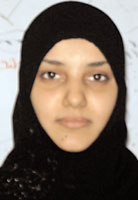
The niqab: Between veneration and tradition [Archives:2008/1140/Reportage]
March 24 2008
 |
 |
Aden Bureau
Since olden times, wearing the niqab (a face covering or veil) has been known as an ancient Arab tradition practiced by those living in the Arabian desert, where a man would wear a scarf on his head and then cover his face with a piece of it to protect himself from the dust.
Likewise, Arab women practiced the same tradition until Islam emerged in the fifth century A.D. and obliged Muslim women to cover their entire body.
Despite Islamic legislators who differ over the Islamic niqab, they unanimously agree that Islamic Sharia law stipulates that a Muslim woman must conceal her beauty and charms, as cited in the Qur'an. All four Islamic sects are in consensus that concealing one's charms is mandatory for every Muslim woman. Thus, the habit spread among various Arab and Islamic societies, including Yemen.
Students in the 1980s attended classes in coeducational schools and universities in the southern governorates (known as the People's Democratic Republic of Yemen prior to reunification), particularly in Aden, a city known to the outside world since the British occupation came to Yemen in 1839 and spread liberal western culture without restrictions.
With all of its positives and negatives, such liberal culture remained until Yemen achieved independence from the British in 1967. Even after they left South Yemen, part of that liberal culture remained in existence, with citizens there knowing nothing about the niqab, except those in rural communities.
Thus, the emergence and spread of the tradition of wearing the niqab seemingly is traceable to a well-organized Islamic awakening.
The Yemen Times surveyed members of the local community, who provided the following viewpoints regarding the tradition.
Some girls favor wearing the niqab out of respect for Islam while others wear it as a fashionable style of dress. Some prefer wearing it to protect their complexion, mainly those living in hot areas, while others have mishandled the practice of the habit.
Also known as a burqa, the niqab is a veil a Muslim woman wears to cover her face, as stipulated in several Qur'anic verses and prophetic hadiths.
Not all Muslim women practice the tradition in the same way, as it varies according to her personal liberty and viewpoint, the community where she lives and prevailing customs and habits.
While wearing the niqab has become common among women and young girls, the purpose of exercising the tradition notably varies due to multiple factors, some of which are cited above. For example, wearing the niqab has become one of the easiest means for schoolgirls to cheat on their exams.
Asked whether women wear the niqab out of respect for their social or religious principles, as a result of environmental factors, for fashion, to imitate others or some other reason, housewife Tharwa Ahmad Mohammed replied, “Women wear the niqab not because of personal contentment or being fond of the tradition or due to pressure by male relatives, but because the tradition has become commonplace.
“When a girl is over age 13, she feels obliged to cover her face before strangers (those who are unrelated to her) because it's shameful when a female teenager uncovers her face before strangers. For this reason, the habit was inherited from our forefathers.”
She continued, “However, if a woman wears the niqab, it doesn't mean she won't be exposed to harassment or indecent molestation because we often find that neither wearing it nor leaving the face uncovered will help a woman to avoid harassment or molestation.”
According to Ishraq Tawfiq, a civil engineering student at Aden University, young girls don the niqab due to harassment by boys, so it may help them avoid such problems. However, she adds that some girls do cover their faces out of respect for their religion, whereas those who mishandle the practicing of the tradition are extremely few and can be counted on one hand.
“Some girls exaggerate wearing the niqab, doing so in order to look more charming or attractive and thereby disrespecting Islam and social values. They also use perfume and apply makeup on their eyes, which can be seen by others, despite wearing the niqab. As a result, those who meet such girls, particularly boys, insult or consider them disrespectfully,” fellow university student Hamasat Al-Mihdhar noted.
No difference
Journalist Nawal Salem maintains that culture and community are two reasons why women wear the niqab, noting that they are responsible for mishandling the practice of the habit, especially those who wear tight abayas to show off their bodies. Such women also wear attractive niqabs and gesture with their heavily made up eyes, thereby drawing others' attention to them.
“In my opinion, there's no difference between a woman wearing a niqab and another with her face uncovered,” Salem says, adding, “I personally respect those who uncover their face, but don't use cosmetics or perfume.”
According to Faris Mohammed Mahmoud, a third-year university student enrolled at Aden University's Faculty of Arts, there's no difference between a veiled and an unveiled woman, provided both behave decently and have good intentions for either practicing or quitting the habit.
“I highly appreciate and respect unveiled women, whereas I disrespect those who use it as a means to attract others,” he said, “Generally, unveiled women behave better than veiled ones because the former fear misbehaving because they can be easily identified.”
Mahmoud continued, “Boys and youths only respond to the behaviors of veiled girls if they are tantalized. Frankly speaking, I prefer a woman who doesn't care about wearing the veil. I prefer my mother, sister or wife to go out in the street with her face uncovered as opposed to wearing the niqab but with a tight abaya.”
——
[archive-e:1140-v:18-y:2008-d:2008-03-24-p:report]


